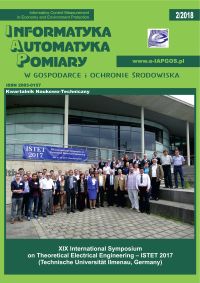HARMONIC DOMAIN MODEL OF AN OPEN-LOOP CONTROLLED PWM CONVERTER
Article Sidebar
Open full text
Issue Vol. 8 No. 2 (2018)
-
TRANSIENT MODELING OF AC MACHINES CONSIDERING SECOND ORDER EFFECTS
Olga Korolova, Juan de la Torre Cubillo, Bernd Ponick4-8
-
ANALYSIS OF AN ANTI-PARALLEL MEMRISTOR CIRCUIT
Valeri Mladenov, Stoyan Kirilov9-14
-
ADVANCED MEMRISTOR MODEL WITH A MODIFIED BIOLEK WINDOW AND A VOLTAGE-DEPENDENT VARIABLE EXPONENT
Valeri Mladenov, Stoyan Kirilov15-20
-
MATHEMATICAL MODELING AND CONTROL SYSTEM OF NEARLY ZERO ENERGY BUILDING
Ildar A. Sultanguzin, Hannes Toepfer, Ivan D. Kalyakin, Alexandr V. Govorin, Ekaterina V. Zhigulina, Sergey Yu. Kurzanov, Yury V. Yavorovsky21-24
-
HARMONIC DOMAIN MODEL OF AN OPEN-LOOP CONTROLLED PWM CONVERTER
Malte John, Axel Mertens25-29
-
MAGNETIC FIELD OF COAXIAL SQUARE COILS ENCLOSED WITH HIGH-PERMEABILITY MATERIAL
Anamarija Juhas, Neda Pekaric Nad, Hannes H. Toepfer30-34
-
A DISTRIBUTED METHOD FOR TRANSIENT SIMULATIONS THAT DYNAMICALLY CONSIDERS SUPPLEMENTARY RESULTS FROM AUTONOMOUS SOFTWARE AGENTS
Matthias Jüttner, Sebastian Grabmaier, Jonas Rohloff, Desirée Vögeli, Wolfgang M. Rucker, Peter Göhner, Michael Weyrich35-38
-
MULTISENSORS FOR WHOLE-CELL ANALYTICS
Ingo Tobehn-Steinhäuser, Margarita Günther, Stefan Görlandt, Steffen Herbst, Heike Wünscher, Thomas Ortlepp, Gerald Gerlach39-41
-
TOOLS FOR COMPARING THE RESULTS OF THE WORK OF SORTING ALGORITHMS
Larysa Gumeniuk, Vladimir Lotysh, Pavlo Gumeniuk42-45
-
MODIFIED, COMPLEMENTED TAXONOMY OF FAULTS IN FAULT-TOLERANT REAL-TIME SYSTEMS
Volodymyr Mosorov, Taras Panskyi, Sebastian Biedron46-49
-
THE APPLICATION OF REDUNDANCY IN LEACH PROTOCOL
Volodymyr Mosorov, Sebastian Biedron, Taras Panskyi50-53
-
ANALYSIS MEDICAL AND STEREOSCOPIC IMAGES BY E-MEDICUS SYSTEM
Tomasz Rymarczyk54-57
-
ANALYSIS OF THE EFFECTIVENESS OF SELECTED SEGMENTATION METHODS OF ANATOMICAL BRAIN STRUCTURES
Róża Dzierżak, Magdalena Michalska58-61
-
ANALYSIS OF METROLOGICAL PROPERTIES FIBER BRAGG GRATINGS WITH A CONSTANT AND VARIABLE PERIOD
Tomasz Zieliński, Piotr Kisała62-67
-
A COMPARISON STUDY OF THE FEATURES OF DC/DC SYSTEMS WITH SI IGBT AND SIC MOSFET TRANSISTORS
Karol Fatyga, Łukasz Kwaśny, Bartłomiej Stefańczak68-71
-
PROPOSAL FOR MANAGING ELECTRIC ENERGY QUALITY IN THE LV GRID USING ON-LOAD TAP CHANGER WITH A STATIC SYNCHRONOUS COMPENSATOR
Bartłomiej Mroczek, Karol Fatyga72-78
-
ASSESSMENT OF FUEL MOVEMENT IN COMBUSTION PROCESS BASED ON THE DIGITAL IMAGE
Łukasz Pater79-82
-
NONLINEAR ANALYSIS OF HIGH Q RADIO FREQUENCY ENERGY HARVESTING NETWORKS
Christian Merz, Gerald Kupris83-86
Archives
-
Vol. 10 No. 4
2020-12-20 16
-
Vol. 10 No. 3
2020-09-30 22
-
Vol. 10 No. 2
2020-06-30 16
-
Vol. 10 No. 1
2020-03-30 19
-
Vol. 9 No. 4
2019-12-16 20
-
Vol. 9 No. 3
2019-09-26 20
-
Vol. 9 No. 2
2019-06-21 16
-
Vol. 9 No. 1
2019-03-03 13
-
Vol. 8 No. 4
2018-12-16 16
-
Vol. 8 No. 3
2018-09-25 16
-
Vol. 8 No. 2
2018-05-30 18
-
Vol. 8 No. 1
2018-02-28 18
-
Vol. 7 No. 4
2017-12-21 23
-
Vol. 7 No. 3
2017-09-30 24
-
Vol. 7 No. 2
2017-06-30 27
-
Vol. 7 No. 1
2017-03-03 33
-
Vol. 6 No. 4
2016-12-22 16
-
Vol. 6 No. 3
2016-08-08 18
-
Vol. 6 No. 2
2016-05-10 16
-
Vol. 6 No. 1
2016-02-04 16
Main Article Content
DOI
Authors
malte.john@ial.uni-hannover.de
Abstract
An harmonic domain model is developed for open-loop controlled voltage source inverters, which provides the steady-state solution for integer multiples of the fundamental frequency. The convolution of the switching function spectrum with the converter currents and voltages is used to describe the coupling of the AC side and the DC side. The modeling is based on a single phase leg and is extended to a single-phase and a three-phase voltage source inverter, which results in a non-linear algebraic equation system. For open-loop control the switching function is independent of the converter currents and voltages and the model is simplified to a linear equation system. This straightforward and fast model is verified by time domain simulations and experimental results. The modeling can be adapted to systems of coupled converters, which is presented for a back-to-back converter system showing the harmonic interaction of the connected subsystems.
Keywords:
References
Arrillaga J., Watson N.R.: The Harmonic Domain revisited. 13th International Conference on Harmonics and Quality of Power, 2008.
Bierhoff M.H., Fuchs F.W.: DC-Link Harmonics of Three-Phase Voltage-Source Converters Influenced by the Pulsewidth-Modulation Strategy–An Analysis. IEEE Transactions on Industrial Electronics. 55(5)/2008, 2085–2092.
Black H.S.: Modulation Theory. Van Nostrand, Princeton 1953.
Chang G.W., Chen S.K., Su H.J., Wang P.K.: Accurate Assessment of Harmonic and Interharmonic Currents Generated by VSI-Fed Drives Under Unbalanced Supply Voltages. IEEE Transactions on Power Delivery 26(2)/2011, 1083–1091.
Chierchie F., Stefanazzi L., Paolini E.E., Oliva A.R.: Frequency Analysis of PWM Inverters With Dead-Time for Arbitrary Modulating Signals. IEEE Transactions on Power Electronics 29(6)/2014, 2850–2860.
Collins C.D., Bathurst G.N., Watson N.R., Wood A.R.: Harmonic domain approach to STATCOM modelling. Transmission and Distribution IEE Proceedings - Generation 152(2)/2005, 194–200.
Holmes G., Lipo T.A.: Pulse Width Modulation for Power Converters: Principles and Practice. Wiley-IEEE Press, 2003.
McGrath B.P., Holmes D.G.: A General Analytical Method for Calculating Inverter DC-Link Current Harmonics. IEEE Transactions on Industry Applications 45(5)/2009, 1851–1859.
Nduka O.S., Pal B.C.: Harmonic Domain Modeling of PV System for the Assessment of Grid Integration Impact. IEEE Transactions on Sustainable Energy 8(3)/2017, 1154–1165.
Smith B.C., Watson N.R., Wood A.R., Arrillaga J.: Steady state model of the AC/DC convertor in the harmonic domain. IEE Proceedings - Generation, Transmission and Distribution 142(2)/1995, 109–118.
Song Z., Sarwate D.V.: The frequency spectrum of pulse width modulated signals. Signal Processing 83(10)/2003, 2227–2258.
Yue X., Zhuo F., Yang S., Pei Y., Yi H.: A Matrix-Based Multifrequency Output Impedance Model for Beat Frequency Oscillation Analysis in Distributed Power Systems. In IEEE Journal of Emerging and Selected Topics in Power Electronics 4(1)/2016, 80–92.
Article Details
Abstract views: 354
License

This work is licensed under a Creative Commons Attribution-ShareAlike 4.0 International License.






